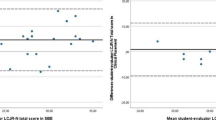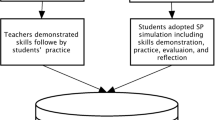Abstract
Background: In nursing education, self-assessment associated with effective feedback promotes reflective learning, which is crucial for the acquisition of complex skills such as clinical judgment. The Lasater Clinical Judgment Rubric (LCJR) is one of the most frequently used scales for the evaluation of self-assessment among nursing students and it can be used by students and instructors for providing shared clinical judgment feedback. However, too few studies have evaluated its applicability. Objective of the study was to compare the LCJR scores assigned by the instructors with those self-reported by the nursing students to evaluate the students’ self-assessment skills. Methods: A comparative study was conducted in a probabilistic sample of 80 students enrolled in the 3rd year of the Nursing Programme in an Italian University. At the end of the high-fidelity simulation, the students and two instructors completed the LCJR scale. Results: The mean scores reported by instructors and students in the 4 subscales of LCJR were similar. In the 3 subscales, “Interpreting”, “Responding” and “Reflecting”, no significant differences were observed; only in the cognitive domain “Noticing” was a difference at the limit of statistical significance (p = 0.049) observed, with a slightly higher scores reported by instructors. Finally, the mean score of Overall Clinical Judgment of the LCJR scale reported by the instructors was slightly higher than that of the students (p = 0.044). Conclusions: Our results suggest that LCJR provides a common language between students and teachers and increases the training effectiveness of high-fidelity simulation through self-directed and reflective learning.
Access this chapter
Tax calculation will be finalised at checkout
Purchases are for personal use only
Similar content being viewed by others
References
Lewis, K.A., Ricks, T.N., Rowin, A., Ndlovu, C., Goldstein, L., McElvogue, C.: Does simulation training for acute care nurses improve patient safety outcomes: a systematic review to inform evidence-based practice. Worldviews Evid. Based Nurs. 16(5), 389–396 (2019)
Rubbi, I., et al.: Incidence and type of health care associated injuries among nursing students: an experience in northern Italy. Acta Biomed. 89(7-S), 41–49 (2018)
Gatewood, E.: Use of simulation to increase self-directed learning for nurse practitioner students. J. Nurs. Educ. 58(2), 102–106 (2019)
Alberti, S., Motta, P., Ferri, P., Bonetti, L.: The effectiveness of team-based learning in nursing education: a systematic review. Nurse Educ. Today 97, 104721 (2021)
La Cerra, C., et al.: Effects of high-fidelity simulation based on life-threatening clinical condition scenarios on learning outcomes of undergraduate and postgraduate nursing students: a systematic review and meta-analysis. BMJ Open 9(2), e025306 (2019)
Chernikova, O., Heitzmann, N., Stadler, M., Holzberger, D., Seidel, T., Fischer, F.: Simulation-based learning in higher education: a meta-analysis. Rev. Educ. Res. 90(4), 499–541 (2020)
Masotta, V., et al.: The concept of high-fidelity simulation and related factors in nursing education: a scoping review. In: Kubincová, Z., Lancia, L., Popescu, E., Nakayama, M., Scarano, V., Gil, A.B. (eds.) MIS4TEL 2020. AISC, vol. 1236, pp. 119–126. Springer, Cham (2021)
Dante, A., et al.: The lived experiences of intensive care nursing students exposed to a new model of high-fidelity simulation training: a phenomenological study. BMC Nurs. 20, 154 (2021)
Ferri, P., et al.: Interprofessional high-fidelity simulation on nursing students’ collaborative attitudes: a quasi-experimental study using a mixed-methods approach. Adv. Intell. Syst. Comput. 1236, 99–110 (2021)
Rubbi, I., et al.: The skill of nursing students trained in the evaluation of electrocardiographic trace: a comparison with emergency nurses. Acta Biomed. 92(S2), e2021507 (2021)
Ferri, P., et al.: The collaboration among pediatric residents, nursing and midwifery students for newborn health: a quasi-experimental study on interprofessional high-fidelity patient simulation. Lect. Notes Netw. Syst. 326, 197–209 (2022)
Rubbi, I., Ferri, P., Andreina, G., Cremonini, V.: Learning in clinical simulation: observational study on satisfaction perceived by students of nursing. Prof. Inferm. 69(2), 84–94 (2016)
Kerr, D., Ratcliff, J., Tabb, L., Walter, R.: Undergraduate nursing student perceptions of directed self-guidance in a learning laboratory: an educational strategy to enhance confidence and workplace readiness. Nurse Educ. Pract. 42, 102669 (2020)
Evans, C.: Making sense of assessment feedback in higher education. Rev. Educ. Res. 83, 70–120 (2013)
Grion, V., Tino, C.: Toward a “sustainable assessment” in Higher Education: perceptions of the giving and receiving peer feedback effectiveness. Lifelong Lifewide Learning 14(31), 38–55 (2018)
Margottini, M., Rossi, F.: Self-assessment tools for strategic learning and vocational skills. Italian J. Educ. Res. (2019). https://doi.org/10.7346/SIRD-1S2019-P223
Sundler, A.J., Pettersson, A., Berglund, M.: Undergraduate nursing students’ experiences when examining nursing skills in clinical simulation laboratories with high-fidelity patient simulators: a phenomenological research study. Nurse Educ. Today 35(12), 1257–1261 (2015)
Liang, H.Y., Tang, F.I., Wang, T.F., Yu, S.: Evaluation of Nurse Practitioners’ professional competence and comparison of assessments using multiple methods: self-assessment, peer assessment, and supervisor assessment. Asian Nurs. Res. (Korean Soc. Nurs. Sci.) 15(1), 30–36 (2021)
Lasater, K.: Clinical judgment development: using simulation to create an assessment rubric. J. Nurs. Educ. 46(11), 496–503 (2007)
Tanner, C.A.: Thinking like a nurse: a research-based model of clinical judgment in nursing. J. Nurs. Educ. 45(6), 204–211 (2006)
Adamson, K.A., Gubrud, P., Sideras, S., Lasater, K.: Assessing the reliability, validity, and use of the Lasater Clinical Judgment Rubric: three approaches. J. Nurs. Educ. 51(2), 66–73 (2012)
Román-Cereto, M., et al.: Cultural adaptation and validation of the Lasater Clinical Judgment Rubric in nursing students in Spain. Nurse Educ. Today 64, 71–78 (2018)
Vreugdenhil, J., Spek, B.: Development and validation of Dutch version of Lasater Clinical Judgment Rubric in hospital practice: an instrument design study. Nurse Educ. Today 62, 43–51 (2018)
Yang, F., et al.: Improving clinical judgment by simulation: a randomized trial and validation of the Lasater clinical judgment rubric in Chinese. BMC Med. Educ. 19(1), 20 (2019)
Ashcraft, A.S., Opton, L., Bridges, R.A., Caballero, S., Veesart, A., Weaver, C.: Simulation evaluation using a modified Lasater Clinical Judgment Rubric. Nurs. Educ. Perspect. 34(2), 122–126 (2013)
Lasater, K.: Clinical judgment: the last frontier for evaluation. Nurse Educ. Pract. 11(2), 86–92 (2011)
Jensen, R.: Clinical reasoning during simulation: comparison of student and faculty ratings. Nurse Educ. Pract. 13(1), 23–28 (2013)
Lee, K.C.: The Lasater Clinical Judgment Rubric: implications for evaluating teaching effectiveness. J. Nurs. Educ. 60(2), 67–73 (2021)
Sousa, V.D., Rojjanasrirat, W.: Translation, adaptation and validation of instruments or scales for use in cross-cultural health care research: a clear and user-friendly guideline. J. Eval. Clin. Pract. 17(2), 268–274 (2011)
Shim, K., Shin, H., Rim, D.: Analysis of students’ clinical judgment process during nursing simulation. J. Korea Acad. Industr. Cooperation Soc. 19(9), 130–138 (2018)
Strickland, H.P., Cheshire, M.H., March, A.L.: Clinical judgment during simulation: a comparison of student and faculty scores. Nurs. Educ. Perspect. 38(2), 85–86 (2017)
Lasater, K., Nielsen, A.: Reflective journaling for clinical judgment development and evaluation. J. Nurs. Educ. 48(1), 40–44 (2009)
Issenberg, S.B., McGaghie, W.C., Petrusa, E.R., Lee, G.D., Scalese, R.J.: Features and uses of high-fidelity medical simulations that lead to effective learning: a BEME systematic review. Med. Teach. 27(1), 10–28 (2005)
Author information
Authors and Affiliations
Corresponding author
Editor information
Editors and Affiliations
Rights and permissions
Copyright information
© 2023 The Author(s), under exclusive license to Springer Nature Switzerland AG
About this paper
Cite this paper
Bertozzi, S. et al. (2023). Clinical Judgment Skills Assessment in High Fidelity Simulation: A Comparison Study in Nursing Education. In: Kubincová, Z., Melonio, A., Durães, D., Rua Carneiro, D., Rizvi, M., Lancia, L. (eds) Methodologies and Intelligent Systems for Technology Enhanced Learning, Workshops, 12th International Conference. MIS4TEL 2022. Lecture Notes in Networks and Systems, vol 538. Springer, Cham. https://doi.org/10.1007/978-3-031-20257-5_14
Download citation
DOI: https://doi.org/10.1007/978-3-031-20257-5_14
Published:
Publisher Name: Springer, Cham
Print ISBN: 978-3-031-20256-8
Online ISBN: 978-3-031-20257-5
eBook Packages: Intelligent Technologies and RoboticsIntelligent Technologies and Robotics (R0)




